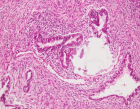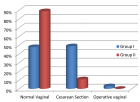Abstract
Research Article
An Audit on the implementation of administering Ondansetron in children with acute gastroenteritis and its effect on admission rate
Saskia D’Sa*, Ahad Hussain, Mushtaq Hussain, Zahir Afridi, John Twomey and Irfan Ahmed
Published: 25 March, 2021 | Volume 4 - Issue 1 | Pages: 023-026
Acute gastroenteritis (AGE) is a common presenting complaint in paediatrics. Most often, the reason for admission into hospital is to initiate intravenous rehydration in patients with severe dehydration and inability to tolerate oral intake. We found that Ondansetron acts as a potent antiemetic to support an increased number of children receiving oral hydration, and subsequently leading to decreased rates of admission. This study aims to audit the use of Ondansetron to Oral Rehydration Therapy (ORT) on children with acute gastroenteritis, and its effect on admission rates from the emergency department in University Hospital, Limerick (UHL). Data collected over a 3-month period from June to August 2017 in which Ondansetron was not used was compared to another 3-month period when Ondansetron was used. Several outcomes were measured including admission to hospital.
The rate of admission decreased by 15% [26/74 (35%) in 2017 to 16/81 (20%) in 2019 p = 0.22]. 81 patients received Ondansetron, of which 79% were successfully rehydrated orally. The administration of Ondansetron reduced the need for intravenous fluids and hospital admission overall in these children with AGE. This reduction ultimately accounted for lower costs incurred by the Health Services Executive per patient, and also suggested the anti-emetic use as a cost effective measure for managing and treating patients with AGE.
Read Full Article HTML DOI: 10.29328/journal.japch.1001025 Cite this Article Read Full Article PDF
References
- Rokach A. Psychological, emotional and physical experiences of hospitalized children. Clin Case Rep Rev. 2016; 2: 399-401.
- Ryan MG, Edwards MS, Torchia MM. Acute viral gastroenteritis in children in resource-rich countries. UpToDate. 2020.
- Hartman S, Brown E, Loomis E, Russell HA. Gastroenteritis in Children. American Academy of Family Physicians. https://www.aafp.org/afp/2019/0201/p159.pdf
- World Health Organization. The Treatment of Diarrhoea - A Manual for Physicians and other senior health care workers. Department of Child and Adolescent Health Development. 2005. https://apps.who.int/iris/bitstream/handle/10665/43209/9241593180.pdf?sequence=1
- Dioralyte Relief Blackcurrant Sachets P. (n.d.). 2020. https://www.medicines.org.uk/emc/product/274/smpc
- Sturm JJ, Hirsh DA, Schweickert A, Massey R, Simon HK. Ondansetron use in the Pediatric Emergency Department and effects on hospitalisation and return rates: are we masking alternate diagnoses? Ann Emerg Med. 2010; 55: 415-422. PubMed: https://pubmed.ncbi.nlm.nih.gov/20031265/
- Das JK, Kumar R, Salam RA, Freedman S, Bhutta ZA. The effect of antiemetics in childhood gastroenteritis. BMC public health. 2013; 13: S9. PubMed: https://www.ncbi.nlm.nih.gov/books/NBK174828/
- Health Services Executive. 2020. Hospital Charges- Acute Hospitals Division. Retrieved from. https://www.hse.ie/eng/about/who/acute-hospitals-division/patient-care/hospital-charges/
- Marchetti F, Bonati M, Maestro A, Zanon D, Rovere F, et al. Oral Ondansetron versus Domperidone for Acute Gastroenteritis in Pediatric Emergency Departments: Multicenter Double Blind Randomized Controlled Trial. PloS One. 2016; 11: e0165441. PubMed: https://pubmed.ncbi.nlm.nih.gov/27880811/
- Mullarkey C, Crowley E, Martin C. The addition of ondansetron to a oral rehydration protocol for children with acute gastroenteritis. Irish Med J. 2013; http://hdl.handle.net/10147/303572
- World Health Organization. Oral Rehydration Salts - Production of the new ORS. Department of Child and Adolescent Health and Development (CAH) World Health Organization. 1998. https://apps.who.int/iris/bitstream/handle/10665/69227/WHO_FCH_CAH_06.1.pdf?sequence=1
Figures:

Figure 1

Figure 2

Figure 3
Similar Articles
-
Congenital poisoning after maternal parenteral mercury administrationBenjamin Courchia*,Leventer Roberts Maya,Meyer John,Galvez Maida,Herrera Jaime,Rauch Daniel. Congenital poisoning after maternal parenteral mercury administration. . 2018 doi: 10.29328/journal.japch.1001001; 1: 001-005
-
The Impact of Adenotonsillectomy on Health-Related Quality of Life in Paediatric PatientsShuaib Kayode Aremu*. The Impact of Adenotonsillectomy on Health-Related Quality of Life in Paediatric Patients. . 2018 doi: 10.29328/journal.japch.1001002; 1: 006-011
-
Severe Infantile Transaldolase deficiency: A case reportKhaled Alqoaer*,Ziad Asaad,Maisa Halabi. Severe Infantile Transaldolase deficiency: A case report. . 2019 doi: 10.29328/journal.japch.1001003; 2: 001-003
-
Prevalence of ESBL urinary tract infection in childrenKhalil Salameh*,Galia ZA Awean,Hala Elmohamed,Hoor Alshmayt,Mohamed Riad Bur Omer . Prevalence of ESBL urinary tract infection in children. . 2019 doi: 10.29328/journal.japch.1001004; 2: 004-007
-
Does it matter what a mother consumes? An anthropological exploration of dietary practices among Churachandpur (Manipur) pregnant women and its impact on infant birth weightJS Sehrawat*,Evelyn Ngaithianven,Reetinder Kaur. Does it matter what a mother consumes? An anthropological exploration of dietary practices among Churachandpur (Manipur) pregnant women and its impact on infant birth weight. . 2019 doi: 10.29328/journal.japch.1001005; 2: 008-014
-
Glycemic status and its effect in Neonatal Sepsis - A prospective study in a Tertiary Care Hospital in NepalBadri Kumar Gupta*,Binod Kumar Gupta,Amit Kumar Shrivastava,Pradeep Chetri. Glycemic status and its effect in Neonatal Sepsis - A prospective study in a Tertiary Care Hospital in Nepal. . 2019 doi: 10.29328/journal.japch.1001006; 2: 015-019
-
Branchio Oculo Facial SyndromeMaha Oudrhiri*,Toualouth L,Houda Oubejja,Fouad Ettayebi,Hicham Zerhouni. Branchio Oculo Facial Syndrome. . 2019 doi: 10.29328/journal.japch.1001007; 2: 020-020
-
Current childhood cancer survivor long-term follow-up practices in South AfricaAnel van Zyl*,Mariana Kruger,Paul C Rogers. Current childhood cancer survivor long-term follow-up practices in South Africa. . 2020 doi: 10.29328/journal.japch.1001008; 3: 001-007
-
Aripiprazole-induced seizures in children with autism spectrum disorder and epilepsyMohammed MS Jan*. Aripiprazole-induced seizures in children with autism spectrum disorder and epilepsy. . 2020 doi: 10.29328/journal.japch.1001009; 3: 008-010
-
Case-based education to improve learning and faculty teaching of residents and students in a clinical settingDiane E Lorant*,Elizabeth A Wetzel. Case-based education to improve learning and faculty teaching of residents and students in a clinical setting. . 2020 doi: 10.29328/journal.japch.1001010; 3: 011-015
Recently Viewed
-
Agriculture High-Quality Development and NutritionZhongsheng Guo*. Agriculture High-Quality Development and Nutrition. Arch Food Nutr Sci. 2024: doi: 10.29328/journal.afns.1001060; 8: 038-040
-
A Low-cost High-throughput Targeted Sequencing for the Accurate Detection of Respiratory Tract PathogenChangyan Ju, Chengbosen Zhou, Zhezhi Deng, Jingwei Gao, Weizhao Jiang, Hanbing Zeng, Haiwei Huang, Yongxiang Duan, David X Deng*. A Low-cost High-throughput Targeted Sequencing for the Accurate Detection of Respiratory Tract Pathogen. Int J Clin Virol. 2024: doi: 10.29328/journal.ijcv.1001056; 8: 001-007
-
A Comparative Study of Metoprolol and Amlodipine on Mortality, Disability and Complication in Acute StrokeJayantee Kalita*,Dhiraj Kumar,Nagendra B Gutti,Sandeep K Gupta,Anadi Mishra,Vivek Singh. A Comparative Study of Metoprolol and Amlodipine on Mortality, Disability and Complication in Acute Stroke. J Neurosci Neurol Disord. 2025: doi: 10.29328/journal.jnnd.1001108; 9: 039-045
-
Development of qualitative GC MS method for simultaneous identification of PM-CCM a modified illicit drugs preparation and its modern-day application in drug-facilitated crimesBhagat Singh*,Satish R Nailkar,Chetansen A Bhadkambekar,Suneel Prajapati,Sukhminder Kaur. Development of qualitative GC MS method for simultaneous identification of PM-CCM a modified illicit drugs preparation and its modern-day application in drug-facilitated crimes. J Forensic Sci Res. 2023: doi: 10.29328/journal.jfsr.1001043; 7: 004-010
-
A Gateway to Metal Resistance: Bacterial Response to Heavy Metal Toxicity in the Biological EnvironmentLoai Aljerf*,Nuha AlMasri. A Gateway to Metal Resistance: Bacterial Response to Heavy Metal Toxicity in the Biological Environment. Ann Adv Chem. 2018: doi: 10.29328/journal.aac.1001012; 2: 032-044
Most Viewed
-
Evaluation of Biostimulants Based on Recovered Protein Hydrolysates from Animal By-products as Plant Growth EnhancersH Pérez-Aguilar*, M Lacruz-Asaro, F Arán-Ais. Evaluation of Biostimulants Based on Recovered Protein Hydrolysates from Animal By-products as Plant Growth Enhancers. J Plant Sci Phytopathol. 2023 doi: 10.29328/journal.jpsp.1001104; 7: 042-047
-
Sinonasal Myxoma Extending into the Orbit in a 4-Year Old: A Case PresentationJulian A Purrinos*, Ramzi Younis. Sinonasal Myxoma Extending into the Orbit in a 4-Year Old: A Case Presentation. Arch Case Rep. 2024 doi: 10.29328/journal.acr.1001099; 8: 075-077
-
Feasibility study of magnetic sensing for detecting single-neuron action potentialsDenis Tonini,Kai Wu,Renata Saha,Jian-Ping Wang*. Feasibility study of magnetic sensing for detecting single-neuron action potentials. Ann Biomed Sci Eng. 2022 doi: 10.29328/journal.abse.1001018; 6: 019-029
-
Pediatric Dysgerminoma: Unveiling a Rare Ovarian TumorFaten Limaiem*, Khalil Saffar, Ahmed Halouani. Pediatric Dysgerminoma: Unveiling a Rare Ovarian Tumor. Arch Case Rep. 2024 doi: 10.29328/journal.acr.1001087; 8: 010-013
-
Physical activity can change the physiological and psychological circumstances during COVID-19 pandemic: A narrative reviewKhashayar Maroufi*. Physical activity can change the physiological and psychological circumstances during COVID-19 pandemic: A narrative review. J Sports Med Ther. 2021 doi: 10.29328/journal.jsmt.1001051; 6: 001-007

HSPI: We're glad you're here. Please click "create a new Query" if you are a new visitor to our website and need further information from us.
If you are already a member of our network and need to keep track of any developments regarding a question you have already submitted, click "take me to my Query."















































































































































